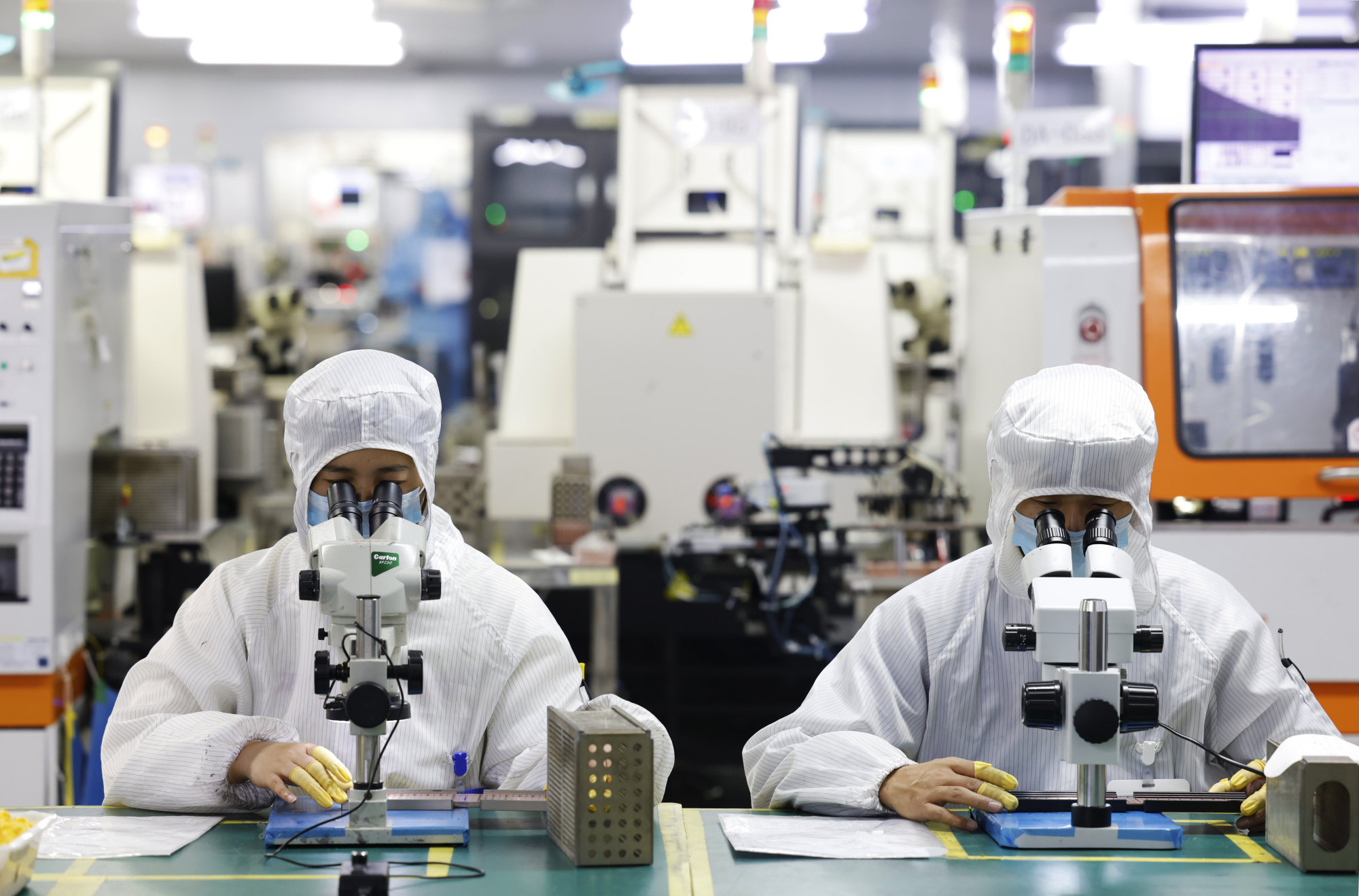
China chip makers scramble for semiconductor talent, showering fresh graduates with offers as peers in other fields face dim prospects
- In contrast with many industries, the semiconductor sector is facing a significant – and growing – talent gap
- With public and private money flowing into the chip industry, qualified graduates from top schools are getting multiple offers and lucrative pay packages
Despite having to do Covid-19 tests repeatedly, Wang Min, a manager at a Guangzhou-based car chip maker, took a train trip to Wuhan last month, hoping to hire graduates from a top Chinese university for his company.
Wang was late and came back empty-handed. “Students who will graduate from the school in July have already secured their offers,” Wang said. “We plan to go on our talent hunts in August or September for students who will graduate next year,” he added.
However, postgraduates with expertise in semiconductors and microelectronics are in high demand, and firms in chip design, new-energy vehicles, and internet services are all vying for them by offering lucrative packages.

Postgraduates who majored in integrated circuits, microelectronics or computer science from the top Chinese schools, known as 985 and 211 universities, can sometimes secure four or five offers before their graduation, according to semiconductor headhunters and industry professionals. These in-demand graduates are seeing pre-tax annual packages up to 500,000 yuan (US$75,000), along with other perks such as stock options.
Wang’s firm is among China’s 3,000 semiconductor design companies in desperate need of fresh blood to expand. In 2021, about 70 per cent of Chinese semiconductor firms tried to recruit fresh graduates, an increase of 20 per cent year on year, according to Fuxing Tech, a school hiring services provider affiliated with the Shanghai-based Human Resources Association of the Semiconductor Industry. The association is still surveying the situation in 2022, but the shortage of talent supply remains.
“The total size of school hiring currently exceeds 50,000 in headcount, but the universities can supply about 30,000 graduates with qualified disciplinary backgrounds every year,” said Xu Haiyan, a former Intel hiring manager and secretary general of the association.
Yangtze Memory Technology, a major Chinese memory chip maker in Wuhan, for instance, has this week started recruitment of undergraduate, postgraduate and doctorate students who will graduate next year. It has opened over 40 job titles in Wuhan, Shanghai and Beijing for fresh graduates to apply, and will hire “a number of people” for each job title, which means the total number of new employees could be in the hundreds.
China’s semiconductor industry – comprising design, foundry, and testing and packaging – employed a total of 540,000 people as of October 2021, according to data from the China IC Industry Talent Development Report. Compiled by the China Semiconductor Industry Association and the Human Resources Association of the Semiconductor Industry, the report predicted China would face a talent gap of 200,000 people in the 2022-2023 period because industry-wide demand for talent would grow to 760,000 people.

Horace Sun, founder at Shanghai-based semiconductor headhunter Ontop Consulting, started his service mainly for foreign semiconductor companies on the mainland around 2012. He has now shifted to focus on Chinese clients. “An annual salary of 400,000 to 450,000 yuan has become a normal level for postgraduates hired by Chinese semiconductor design firms,” Sun said.
In fact, the pay level for both fresh graduates and experienced professionals has been rising steadily over the past decade, he said.
“Despite being considered a hi-tech industry, the average salary package 10 years ago was much lower compared to China’s real estate sector and internet companies,” Sun said. “It was a tough job, with long hours and low salary. Nobody really wanted to work in the chip industry except those who majored in microelectronics. Most students with a science and engineering background would choose to work for internet companies.”
The situation has changed gradually, with salaries at semiconductor firms becoming more attractive as both state and private money flowed in to support China’s drive to develop its semiconductor industry amid a China-US tech war centred on tiny chips.
“Many Chinese venture-capital funds said they started looking at the chip industry after 2018,” said Xu of the Semiconductor Human Resources Association. “These venture capitalists used to bury their noses in the internet companies.”
Among China’s top 15 talent-thirsty industries, semiconductors and computer software ranked No 1 and No 2 in their need for new graduates in 2022. And both sectors have increased their demand for fresh graduates for three years in a row, according to a report from 51job.com, one of the largest job boards in China. The report said master’s degree graduates from 985 and 211 universities surveyed in the report receive 4.2 job offers on average.
“There are many kids who have received five to six offers,” said Xu.
China imports fewer chips as self-sufficiency drive shapes up
Moreover, only about 15 per cent of graduates with an integrated-circuit background actually enter the chip industry, Xu added, as they are lured by companies in multiple technology fields.
Over the last three years, competition for experienced workers intensified. That led to firms snapping up so many postgraduates from the elite universities that leading headhunters now have to consider postgraduates from less prestigious schools, according to headhunters.
Meanwhile, Chinese schools have been rushing to expand their training of semiconductor engineers. At least a dozen Chinese universities, including the prestigious Tsinghua University and Peking University, have established independent integrated-circuit colleges.

